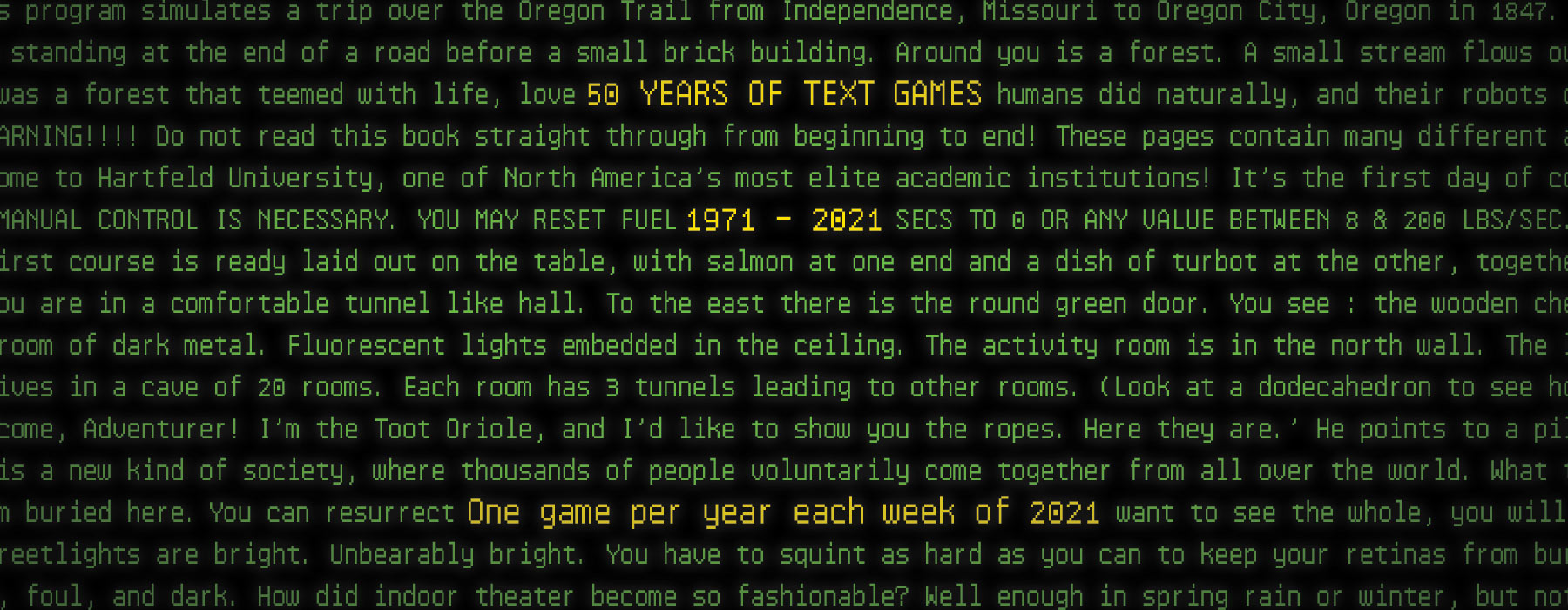Nerd alert! Do you remember those old-school text adventure games, aka interactive fiction?
> GO EAST
You enter Jerzy's office. You see an accordion and some junk mail here.
> TAKE ACCORDION
Taken.
> PLAY ACCORDION
You don't know any tunes on the accordion.
…and so on? Well, I recently discovered the excellent “50 Years of Text Games” blog. It’s been fun to revisit some old memories and learn about some lost gems. Maybe you’ll enjoy it too.1

The blog is a delightful romp through the past 50 years of such games, one game per year. It starts with the original version of Oregon Trail(!); covers classics like Adventure and Zork; includes related works like Choose Your Own Adventure books; and continues on to modern games experimenting with these forms. The author talks about each game’s influence on the genre, its historical context, and some of his favorite puzzles or other moments in the game. Some articles also have a nifty overview of how the technology of the time either enabled or restricted some of the designer’s creative choices.
Some of my favorite articles from the series so far:
- Oregon Trail (1971) – the original ORIGINAL edutainment
- Plundered Hearts (1987) – a seriously well-written pirate romance adventure game, by one of the few women game designers of the time
- P.R.E.S.T.A.V.B.A. (1988) – Eastern European geeks use games as a form of satire and dissent against Soviet occupation
- Silverwolf (1992) – Victorian-LARPing cultists start a successful software company??!?
If you’d actually like to *play* games like these, the Interactive Fiction Database hosts many of them, and most are free to play in the browser. Just choose a game and click “Play On-line” in top right corner.
Three games I’d recommend starting with:
- 9:05 (You woke up late and the phone is ringing, uh-oh… Very short and a great intro to the form, though not appropriate for young kids)
- Gun Mute (Tongue-in-cheek post-apocalyptic cowboy shoot-em-up… Fairly short, and also not for young kids)
- Lost Pig (You’re an orc pig-keeper who can’t find the pig you were tending… Slightly longer, but goofy and kid-friendly)
Two favorite experimental games — not representative of the form, but influential and effective (and not too long):
- Photopia (Should text games be for puzzles or for storytelling?)
- Galatea (Focused entirely on dialogue; a retelling of Pygmalion, by an author with a Classics PhD)
Two longer and harder games I really enjoyed:
- Spider and Web (Some great plot twists that wouldn’t work in any other medium — don’t read about it first!)
- Counterfeit Monkey (The delightful wordplay-based puzzles would already be enough on their own, but on top of it all they are so well integrated with a compelling setting and plot)
- I know, I know, this isn’t what sabbatical is for… I’ll post more about my actual research soon! But I did write about statistics-themed computer games before, and in the years since, it turns out folks have written games that run in R, including a tiny text adventure and a longer one. I’d love to write one too, if only I can figure out how to count it as “research” on my CV :)
